
Housed in the School of Modern Languages, thanks to support from the Atlanta Global Studies Center and the IPaT/GVU Research and Engagement Grants, Villa Albertine and International Education Week, the Voice+ Research Lab is an interdisciplinary voice studies lab that explores the human voice from a variety of perspectives and integrates knowledge and methodologies from different disciplines. It encompasses a wide range of topics related to the voice, including vocal production, vocal health, cultural and historical aspects of vocal expression, and the artistic and expressive use of the voice. Interdisciplinary voice studies aim to provide a holistic understanding of the voice and its multifaceted aspects, fostering collaboration among experts in various fields to explore sound and structures of the human voice. Besides language studies, interdisciplinary voice studies often draw on the expertise of scholars and practitioners from fields such as, but not limited to:
- Music: focusing on vocal techniques, music theory, and the study of vocal performance in various musical genres.
- Technology: Technological advances have also played a role in interdisciplinary voice studies, with research on voice synthesis, speech recognition, and voice analysis.
- Business and Marketing: From Voice-activated virtual assistants to sonic branding and voice advertising, voice is an integral part of marketing strategies.
- Speech and Communication: study of speech, phonetics, and vocal communication, public speaking, acting, and other communication contexts.
- Linguistics: studying language differences, the variations in vocal sounds across cultures, and the role of the voice in language evolution.
- Medicine and Health Sciences: Research in this area explores vocal health, voice disorders, and the medical aspects of vocal production.
- Cultural Studies: considers how the voice is used within cultural and social contexts, including its role in identity, gender, and societal norms.
- Theatre and Performance Studies: looks at the expressive use of the voice in acting, theater, and performance art, as well as the historical and cultural significance of vocal performance.
- Psychology: including the emotional impact of vocal expression, the perception of voice, and the psychological aspects of vocal training and therapy.


